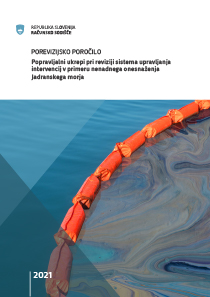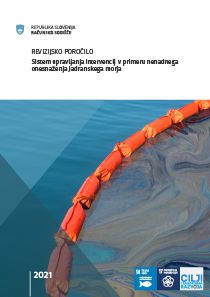The Court of Audit implemented the audit reviewing whether the system of managing interventions in case of sudden pollution in the Adriatic Sea in the period from 1 January 2017 to 31 December 2019 was efficient. The audit was a part of the international parallel audit involving Supreme Audit Institutions of all countries along the Adriatic coast.
The system of managing interventions in case of sudden pollution in the Adriatic Sea involves several stakeholders, while the audit reviewed those that carry the main responsibilities to develop this system, namely the Ministry of Infrastructure, the Ministry of Defence, the Ministry of the Environment and Spatial Planning, the Maritime Administration of the Republic of Slovenia, the Administration of the Republic of Slovenia for Civil Protection and Disaster Relief, the Slovenian Environment Agency, the Slovenian Water Agency and Luka Koper, port and logistic system, public limited company responsible for preventing and fighting sea pollution within the area of a cargo port in Koper.
The Court of Audit found out that the auditees are focused on various measures preventing the occurrence of accidents and consequently pollution of the sea, and that they carry out those measures as well. It, however, pointed out some weaknesses, such as: implementation of the public utility service of maintaining infrastructure for the safety of sea navigation was based on a 17-year-old concession contract. The system of hydrological and meteorological measurements and for providing data necessary for safe navigation at sea was upgraded but was not fully set up. While carrying out maritime pilotage and harbour towage difficulties occurred that could also affect the safety of navigation at sea. In order to remedy disclosed issues the authorised auditees already adopted some measures. Between the years 2017 and 2019 there were 2 cases of emergency related to grounding of tankers. If those accidents caused an oil spill, the consequences could result in a catastrophe for marine environment and also for the coast. An important step towards the improvement of safety in the maritime transport is opening of the marine traffic control centre in 2021. In order to reach the desired level of monitoring and control over the maritime transport, it is necessary to approach towards listing of contents and possible amendments of the legal bases.
The Court of Audit disclosed that procedures to be used in case of pollution of the sea are defined. Smaller scope of pollution is managed by regular units and services of the auditees within their powers, while procedures related to larger scope of pollution are defined in regional plan of protection and disaster relief operations when accidents occur at sea. Thereby, the Court of Audit found out that responsibilities of those that have the permits to use water, i.e. harbours, related to cleaning and remedying water pollution including the tasks of removing collected waste and substances were not always defined in the issued permit. Also the responsibilities for cleaning the coast and offshore areas were not clearly defined. The auditees did not clarify the legal bases enough for the Maritime Administration of the Republic of Slovenia and the Administration of the Republic of Slovenia for Civil Protection and Disaster Relief to be able to impose on the polluters the costs of activities undertaken when fighting the pollution of the sea.
The Court of Audit also established several weaknesses related to the content of the current regional plan of protection and disaster relief operations. All foreseen plans of the state bodies, where tasks of each body are defined in case of activating the plan of protection and disaster relief operations, were not developed respectively were not up-to-date. The Court of Audit assessed that readiness to cooperate and commitment of the stakeholders to participate would be better and more firm if the plan of protection and disaster relief operations was developed at the state level. The Republic of Slovenia would have to ask other states for the assistance when its own resources for protection and disaster relief operations in case of pollution would not suffice. On the basis of the international agreements and conventions the Republic of Slovenia can ask for help other countries and international organisations or can get involved in cross-border actions to prevent or respond in case of major emergency in the Adriatic Sea.
The Slovenian system of managing interventions in case of sudden pollution in the Adriatic Sea foresees gradual activation of forces and means for protection and rescue. In case of larger scope of pollution at sea respectively when capacities of the Maritime Administration of the Republic of Slovenia would not suffice to remedy the consequences of the pollution, additional forces of protection, rescue and assistance are activated through the Administration of the Republic of Slovenia for Civil Protection and Disaster Relief including the request for international assistance. The Court of Audit also established that there was no joint overview of the necessary protection and rescue equipment available in the state if an ecological disaster at sea occurred. The assessment of the necessary equipment that should be at disposal of to the Republic of Slovenia and which should consider the scope of maritime transport, the amount and type of cargo transferred in the Gulf of Trieste and in the Adriatic Sea was not developed. Nevertheless, the auditees estimated that they have sufficient equipment needed to intervene in case of smaller scope of pollution. The data related to available human resources who can intervene in case of large scope of pollution were not complete, furthermore there was no joint overview of human resources who could be involved in such interventions. After the completion of the audit, the Administration of the Republic of Slovenia for Civil Protection and Disaster Relief drew up a new overview of the equipment as well as an overview of human resources trained to intervene in case of large scope of pollution at sea.
Education and training of the participants involved in the interventions are carried out regularly, i.e. in the Republic of Slovenia as well as abroad, in the form of drills open to a wide range of participants what was pointed out by the Court of Audit as positive practice. In case of sudden pollution at sea, good cooperation among all stakeholders authorised for preventing sudden sea pollution and for intervening when pollution occurs is a crucial precondition for effective and efficient responding mainly in cases of a major emergency. According to the assessment of the Court of Audit, it would be appropriate that auditees implement drills also to check response time in cases of dangerous chemicals pollution whereby they could review the availability of necessary equipment to be used and personal protective equipment for such type of pollution.
In the event of a major emergency the auditees would ask each other for help, when their capacities for temporary storage of collected waste and substances are filled. The Court of Audit found out that there was no protocol defined when capacities of all are filled. Additionally, the location of common temporary disposal of waste was not selected.
On the basis of the implemented audit, the Court of Audit issued an opinion that the system of intervening in case of smaller scope of pollution was partially efficient. Special attention should be placed on the field of mobilisation in case of major emergency which was not efficient in the opinion of the Court of Audit. In this context, the key element is good cooperation among all stakeholders with powers in the field of preventing sudden pollution at sea and powers to intervene in cases of pollution in the Republic of Slovenia. According to the opinion of the Court of Audit, the aforementioned is a necessary precondition for efficient and effective responding in cases of sudden pollution at sea, especially in the events of major emergency. Furthermore, full commitment to cooperating with the international community is of vital importance, since any major pollution along the Adriatic Sea can represent a significant ecological threat to all countries on the shores of the Adriatic Sea.






